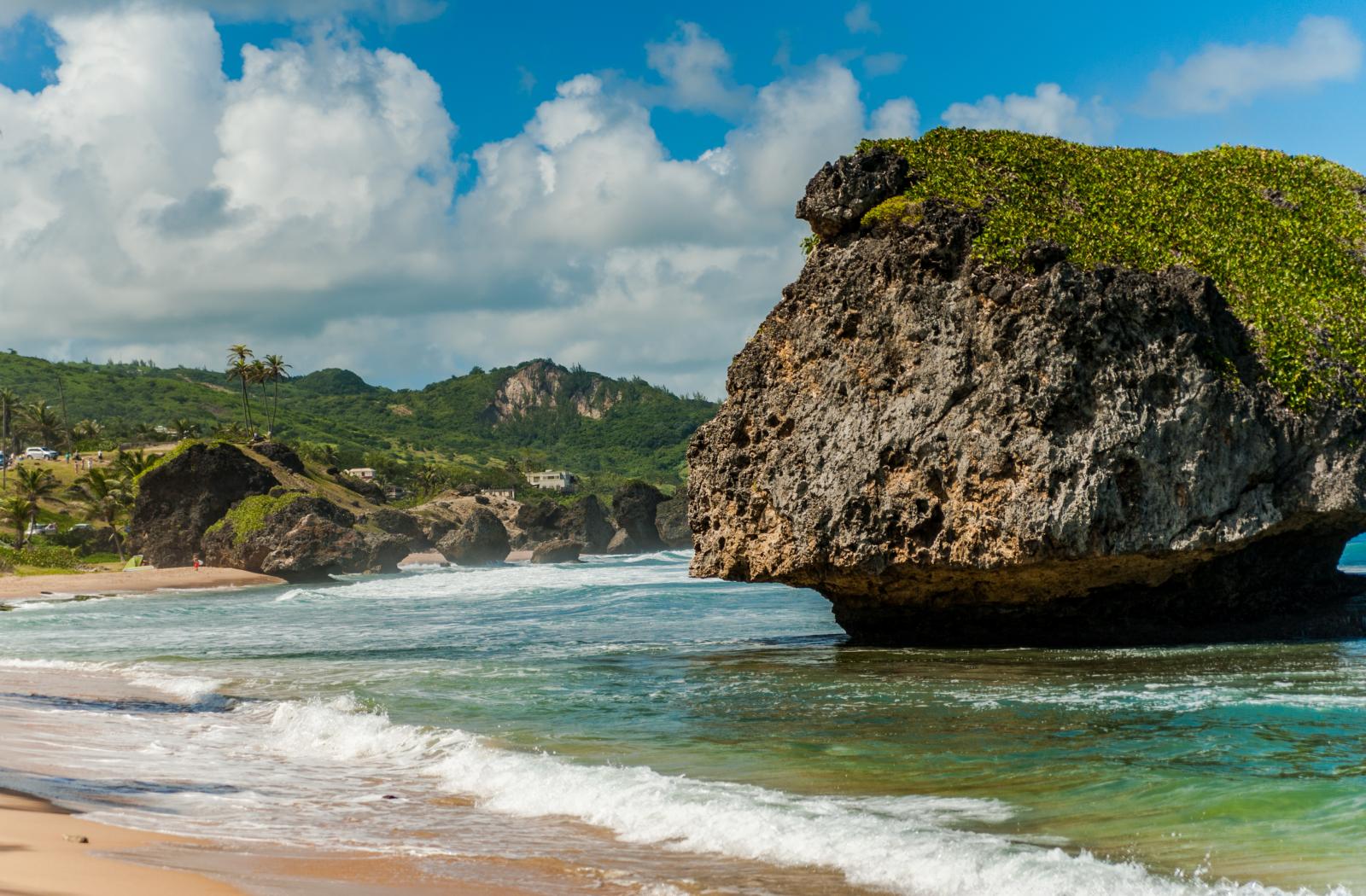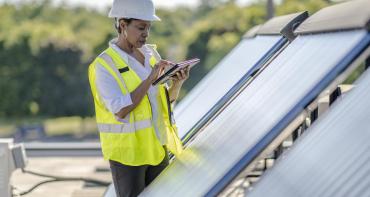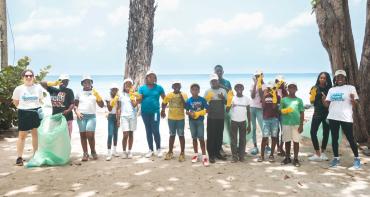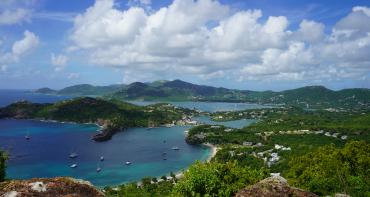A new assessment finds Barbados’ southern and western coastal urban corridor vulnerable to extreme heat events and coastal erosion, and identifies investments and recommendations needed to protect coastal communities

The Barbados Blue Economy Section of the Ministry of the Environment and National Beautification, the Stimson Center’s Environmental Security Program, and the Commonwealth Secretariat through the Commonwealth Blue Charter programme announced today the completion a rapid assessment of climate and ocean risks and options to address these risks in the southern and western coastal urban corridor of Barbados.
The three partner organizations collected data on the extent of climate and ocean risks and surveyed dozens of local experts in order to determine priority climate action and steps for the country to undertake in 2022 and beyond. (This project began under the Barbados Ministry of Maritime Affairs and the Blue Economy.)
The CORVI Rapid Assessment in Barbados identified significant ecological and financial risk, reflecting the urban corridor’s reliance on coastal and marine activities that are increasingly under threat from climate change. The assessment was conducted over six months and is comprised of 30 risk indicators.
The report made three priority recommendations:
- Build resilience in marine ecosystems, which can reduce coastal vulnerability to extreme weather events and provide fish habitat, through protection and restoration.
- Diversify the Barbadian economy to reduce reliance on sun, sea, and sand tourism through targeted support for manufacturing, agriculture, renewable energy and more diverse forms of tourism.
- Develop marine heatwave response measures because they are a very high risk for the study area.
Full details of each recommendation are below. Or read the report.
Source of recommendations
These recommendations stem from Barbados’ highest risk indicator scores – Number of Extreme Heat Events (8.29), Level of Shoreline Development (7.90), and Rate of Coastal Erosion (7.33) – which demonstrate that a large proportion of the city’s economic and infrastructural assets, including Deepwater Harbor, hospitals, hotels, coastal highways, desalination plants, and basic service (electricity, health, public safety) infrastructures are increasingly vulnerable to inundation due to coastal and runoff flooding, while heatwaves affect both land and sea. Two other notable high-risk financial indicators are related to tourism and the local shipping industry, which are under great threat from these same risks.
Dr. Leo Brewster, Director of the Coastal Zone Management Unit, Blue Economy Section of the Ministry of Environment and National Beautification, said:
“It’s never been a secret that Barbados is under threat from climate change – it’s something that we’ve battled with first hand for years in the form of rising sea levels, coastal erosion and intense storms What this assessment does is create the preliminary roadmap for dealing with these issues at the local level to ensure we’re making the best possible decisions and investing carefully and efficiently as we intervene to address these climate threats. It also provides opportunities for presenting the information to strategic stakeholders in an easy-to-understand format and improved public education and awareness building.”
Full recommendations
Details behind the recommendations for Barbados determined from this research include:
- Build resilience in marine ecosystems: Marine ecosystems can play an important role in reducing coastal vulnerability to extreme weather events and providing co-benefits, including fish habitat and carbon sequestration. The government and its partners should protect existing marine ecosystems and restore degraded ecosystems, especially coral reefs. They should support this effort through mapping of existing and restorable marine ecosystems and enhanced monitoring, including through the Barbados Coral Reef Monitoring Programme. Stakeholders should incorporate these priorities into ongoing planning efforts, including the marine spatial plan being developed with The Nature Conservancy (TNC) and the Inter-American Development Bank (IADB) and marine-managed areas on the western and southern coasts.
- Diversify the Barbadian economy: Climate change, including shrinking beaches, rising temperatures, and degraded marine ecosystems, increasingly threatens sun, sea, and sand tourism, which is a key part of Barbados’ economy. Key industries should get targeted support from both the public and private sectors. Manufacturing, agriculture, renewable energy, and other diverse forms of tourism are among them. Barbados should build on existing efforts, such as the Farmers Empowerment and Enhancement Drive program, and leverage international support, such as through the new Global Ocean Energy Alliance.
- Develop marine heatwave response measures: Surveys of experts showed marine heatwaves (MHWs) to be very high risk for the study area. The government, private sector, civil society, and academia must work together to build awareness of the risks associated with MHWs and adopt a four-part plan to reduce their impacts. First, improving the health of marine ecosystems will make them more resilient to MHWs. Second, selecting breeding and growth of heat-tolerant coral can reduce the impacts of MHWs, and rising sea temperatures more generally. Third, the government and academic community should work with international partners to improve marine ecosystem monitoring for temperature variations and to improve early warning of MHWs. Fourth, the government and private sector should develop measures to take when MHWs occur to protect vulnerable ecosystems, such as temporarily restricting fishing or expanding protected areas.
“The completion of this pilot project allows Barbados to go in and do the hard work of thwarting some of these climate impacts, with a much clearer picture for how to best approach that work. We now know that building resilience in marine ecosystems, diversifying the Barbadian economy and developing new marine heatwave response measures should be the priority when it comes to addressing these overwhelming challenges.”Share on TwitterHeidi Prislan , Adviser for the Commonwealth Blue Charter
“Island states, like Barbados, are often the least responsible for climate change but are the most vulnerable to climate impacts. As a country that relies on its blue economy and is living with climate change every day, Barbados is seeking ways to build resilience where it is needed most. This means seeking detailed information to accelerate the actions needed to reduce these ecological and financial risks associated with climate change. We’re proud of the partnership and the work we’ve done in Barbados, and extremely grateful to everyone there who made this project possible. We look forward to continuing to work with the government of Barbados to protect its citizens from these risks.”Share on TwitterSally Yozell , Senior Fellow, Director of the Stimson Center’s Environmental Security Program, and project lead for CORVI
About the CORVI Rapid Assessment
The Rapid Assessment is based on and complements the Climate and Ocean Risk Vulnerability Index (CORVI) tool, an innovative risk analysis tool that compares a diverse range of economic, social, and environmental risks to produce climate and ocean risk profiles for coastal cities. These detailed profiles help governments, businesses, and financial institutions assess climate risk and pinpoint key areas of action to help the government adapt to the climate emergency. As one of three pilot project countries, Barbados will work with expert analysts to review the results, better understand the available options, and formulate next steps that can be taken in order to develop climate-smart policies based on the report’s recommendations. It is Barbados’ intention to pursue the full CORVI Assessment in the near future.
This project was financially supported by the Ocean Risk and Resilience Action Alliance (ORRAA) in partnership with the Commonwealth Secretariat and the Stimson Center. For more information on Stimson’s Climate Security project and CORVI, visit https://www.stimson.org/project/corvi/
Media contact
Commonwealth Blue Charter
Josephine Latu-Sanft
Stimson Center
Caitlin Goodman or Lily Goldman



